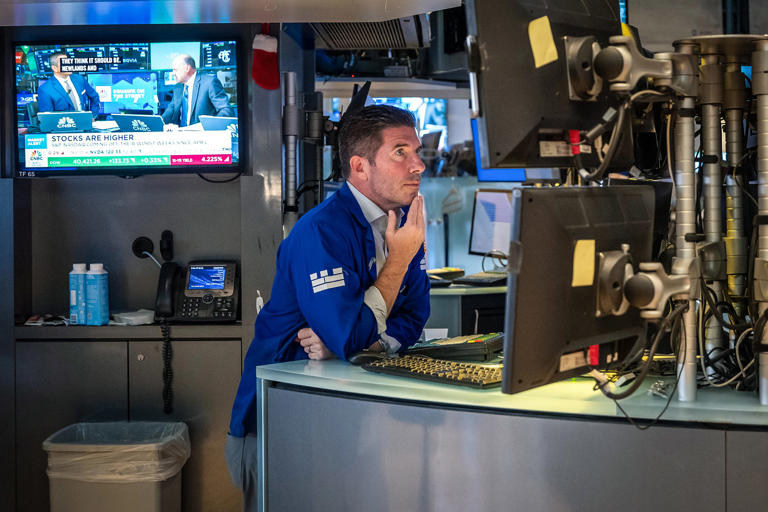On Wednesday, U.S. stocks faced their most significant single-day decline since 2022, as a widespread retreat in technology companies drove a sell-off. Wall Street traders sought to minimize their exposure to firms with substantial investments in artificial intelligence, leading to sharp declines across major indices. The tech-heavy Nasdaq index plunged by 3.6%, marking its worst day in over 18 months. The broader S&P 500 index fell by 2.3%, while the Dow Jones Industrial Average decreased by 1.25%.
The downturn was prominently led by Tesla and Google parent Alphabet. Tesla’s shares nosedived by 12.3%, marking their worst day since 2020. This steep decline followed Tesla’s announcement that its auto revenues had fallen by 7% from the previous quarter. Compounding investors’ concerns, CEO Elon Musk revealed during an earnings call that the company’s anticipated robotaxi rollout would be delayed, casting doubt on Tesla’s immediate growth prospects.
Alphabet’s shares dropped by more than 5%, experiencing their worst day since January. Despite the company meeting analysts’ earnings expectations, traders reacted negatively to CEO Sundar Pichai’s remarks during the earnings call. Pichai highlighted that the substantial investments in artificial intelligence by tech giants would not yield immediate returns, stating, “I think we are in this phase where we have to deeply work and make sure on these use cases [for AI products], on these workflows, we are driving deeper progress on unlocking value, which I’m very bullish will happen. But these things take time.” This cautious outlook led investors to offload shares that had previously surged due to the AI boom.
Steve Sosnick, chief strategist at Interactive Brokers, noted that Wall Street interpreted Pichai’s comments as a cue to sell shares of companies that had benefited from rapid AI-related growth. “We’re seeing some nervous profit-taking in some of the stocks that have been leveraged to AI that a lot of investors have come to rely on as a consistent source of stock market gains,” Sosnick told NBC News. Alphabet’s weaker-than-expected ad revenue from YouTube further contributed to the negative sentiment, exacerbating the sell-off.
Other major technology companies also suffered significant losses. Nvidia, a leading chipmaker integral to the AI revolution, saw its shares drop by more than 6%, marking its worst day since 2022. Facebook parent Meta experienced a 5% decline, Microsoft fell by 3.5%, and Amazon lost 3%. Despite these sharp declines, the major indices have maintained relatively strong performance for the year. Even after Wednesday’s dip, the S&P 500 remains up by 13.8% in 2024, the Nasdaq by 15.5%, and the Dow by 5.7%.
The sell-off occurred amid heightened expectations for an interest rate cut from the Federal Reserve in response to a slowing economy. Traders now anticipate that the Fed’s first rate cut of the post-pandemic period is almost certain by September. Former Federal Reserve Bank of New York President Bill Dudley argued in a Bloomberg News column that the Fed should strongly consider announcing a cut at its upcoming meeting. “Although it might already be too late to fend off a recession by cutting rates, dawdling now unnecessarily increases the risk,” Dudley wrote.
Sosnick emphasized that Wednesday’s stock sell-off was not an outright rejection of the broader economic outlook. Year-to-date, the S&P 500 has gained about 15%, the Nasdaq about 18%, and the Dow Jones Industrial Average about 6%. “This is much more about a little bit of vertigo in names that have climbed a lot this year,” Sosnick said.
Nonetheless, signs of a broader economic pullback are emerging. The U.S. unemployment rate is rising, excess savings from the pandemic have been exhausted, and consumer borrowing stress is at fresh highs. Ian Shepherdson, chief economist at Pantheon Macroeconomics, warned of weak economic growth ahead, writing in a note to clients, “We expect relatively weak economic growth in the second half of 2024 and early 2025.”
This comprehensive decline in the stock market underscores the volatility and uncertainties currently facing investors. While the immediate future remains uncertain, the market’s reaction to forthcoming earnings reports and Federal Reserve decisions will likely provide more clarity on the economic trajectory.
